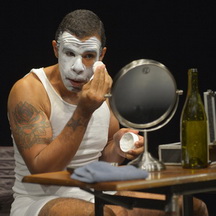Finding Love’s Labours
This past week brought the consummately skilled young actors of the Globe Theater to Cal Performances’ Zellerbach Hall stage in Shakespeare’s Love’s Labours Lost—not one of Will’s most satisfying plays. Nevertheless, the production brought to it everything that was possible, gilding its edges with superlative acting and a charming traditional theatrical production. Everything was in place, so that the play’s lapses—its unsatisfactory conclusion, bumpy action, and often opaque, though scintillatingly beautiful, language—were constantly delightful.
The play’s premise is that a naïve and enthusiastically philosophical royal—Ferdinand, the King of Navarre (Philip Cumbus)—decides to swear himself and his courtiers to a life of scholarly meditation that denies the pleasures of women and their frivolous feminine company. Immediately afterwards a bevy of equally aristocratic, but far more intelligent and witty, beauties arrives on the scene. Sadly for them but entertaining for us (and the ladies), the young gentlemen find their hearts have other ideas than their minds. The play proves once again that rash, extreme promises are never a good idea, and that love is a force equal to any human resolution.
Michelle Terry leads the cast as the Princess of France—don’t the women always lead in Shakespeare’s comedies? Did I even need to ask that?—and I had the great good fortune to see her this past summer in the National Theater production of All’s Well that Ends Well in London. I recognized her by her voice: lower than most small-framed women’s, with a trace of unevenness and a resonant timbre that speaks of both sensuality and power, it’s a perfect voice for a plucky, self-possessed Shakespearean heroine. Her French princess is accompanied by three gracious and flirtatious ladies: Rosaline (Thomasin Rand), Maria (Jade Anouka) and Katherine (Siân Robins-Grace), who manage to bewilder and torment Ferdinand’s love-smitten courtiers: Berowne (Trystan Gravelle), Longaville (William Mannering) and Dumaine (Jack Farthing).
Among the lads, Berowne has the most theatrically rewarding character, something similar to a Fest, who is wiser and wittier than his colleagues, but lacking the ribald devilishness of Olivia’s clown. Gravelle makes the most of the part, adding both masculine grace and gentility to his portrayal.
Unusual among the comic characters is Don Adriano de Armado, described in the cast list as “a braggart from Spain.” Paul Ready does a spectacular job of Armado’s accent, lisping and tripping over malapropisms, and makes as lovable an oaf as has ever pursued a country maid. The other characters from curate to dairymaid present a slice of Tudor society that while made affably ridiculous by the playwright is both engaging and enlightening.
Overseeing the excellent cast was Director Dominic Dromgoole’s appealing vision of the play. Dromgoole, who is the Globe’s artistic director, wrote in a Times article: “theatre needs wit, it needs flair, it needs imagination, but it also, most crucially, needs some sense of gravity, however lightly held—some sense that what is being said matters.”
All of that holds true for this production. From the very opening, with its delicate music composed by Claire van Kampen and played on a variety of early instruments, including recorders, shawms, sackbut and hurdy-gurdy, and the wonderful deer puppets the size of young fawns, manipulated by entertainers in rustic garb, passing through the audience to cavort across the stage sets that only just suggest a court in a pastoral setting, the emphasis of the production is on the humanly scaled. No special effects spill out of the lights, no inflorescent video projections create a world of huge dimensions and dazzling colors that must be accepted rather than created in the viewer’s mind. Everything makes way for the language and the actors’ skill at presenting its rushing cadences and coloring its sounds to project a cascade of meaning. The production steps away, leaving the actors, the language and the audience.
So refreshing.
—Jaime Robles
